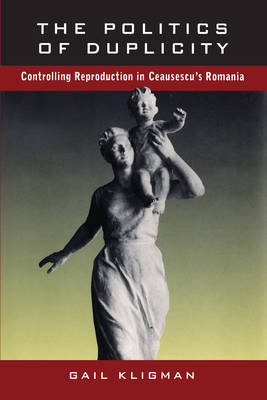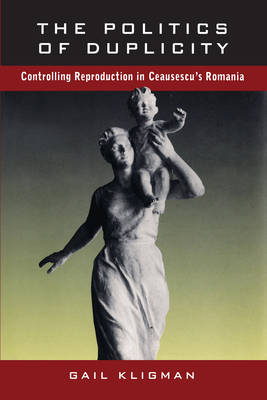
Je cadeautjes zeker op tijd in huis hebben voor de feestdagen? Kom langs in onze winkels en vind het perfecte geschenk!
- Afhalen na 1 uur in een winkel met voorraad
- Gratis thuislevering in België vanaf € 30
- Ruim aanbod met 7 miljoen producten
Je cadeautjes zeker op tijd in huis hebben voor de feestdagen? Kom langs in onze winkels en vind het perfecte geschenk!
- Afhalen na 1 uur in een winkel met voorraad
- Gratis thuislevering in België vanaf € 30
- Ruim aanbod met 7 miljoen producten
Zoeken
The Politics of Duplicity
Controlling Reproduction in Ceausescu's Romania
Gail Kligman
Paperback | Engels
€ 62,95
+ 125 punten
Omschrijving
The political hypocrisy and personal horrors of one of the most repressive anti-abortion regimes in history came to the world's attention soon after the fall of Romanian dictator Nicolae Ceausescu. Photographs of orphans with vacant eyes, sad faces, and wasted bodies circled the globe, as did alarming maternal mortality statistics and heart-breaking details of a devastating infant AIDS epidemic. Gail Kligman's chilling ethnography--of the state and of the politics of reproduction--is the first in-depth examination of this extreme case of political intervention into the most intimate aspects of everyday life.
Ceausescu's reproductive policies, among which the banning of abortion was central, affected the physical and emotional well-being not only of individual men, women, children, and families but also of society as a whole. Sexuality, intimacy, and fertility control were fraught with fear, which permeated daily life and took a heavy moral toll as lying and dissimulation transformed both individuals and the state. This powerful study is based on moving interviews with women and physicians as well as on documentary and archival material. In addition to discussing the social implications and human costs of restrictive reproductive legislation, Kligman explores the means by which reproductive issues become embedded in national and international agendas. She concludes with a review of the lessons the rest of the world can learn from Romania's tragic experience.
Ceausescu's reproductive policies, among which the banning of abortion was central, affected the physical and emotional well-being not only of individual men, women, children, and families but also of society as a whole. Sexuality, intimacy, and fertility control were fraught with fear, which permeated daily life and took a heavy moral toll as lying and dissimulation transformed both individuals and the state. This powerful study is based on moving interviews with women and physicians as well as on documentary and archival material. In addition to discussing the social implications and human costs of restrictive reproductive legislation, Kligman explores the means by which reproductive issues become embedded in national and international agendas. She concludes with a review of the lessons the rest of the world can learn from Romania's tragic experience.
Specificaties
Betrokkenen
- Auteur(s):
- Uitgeverij:
Inhoud
- Aantal bladzijden:
- 350
- Taal:
- Engels
Eigenschappen
- Productcode (EAN):
- 9780520210752
- Verschijningsdatum:
- 6/07/1998
- Uitvoering:
- Paperback
- Formaat:
- Trade paperback (VS)
- Afmetingen:
- 152 mm x 229 mm
- Gewicht:
- 526 g

Alleen bij Standaard Boekhandel
+ 125 punten op je klantenkaart van Standaard Boekhandel
Beoordelingen
We publiceren alleen reviews die voldoen aan de voorwaarden voor reviews. Bekijk onze voorwaarden voor reviews.









